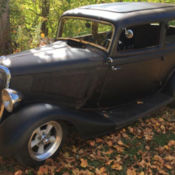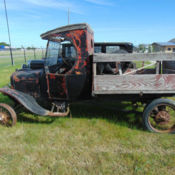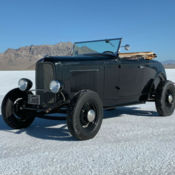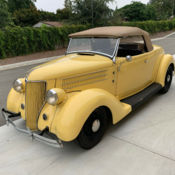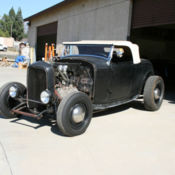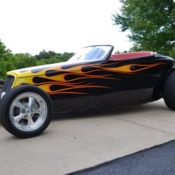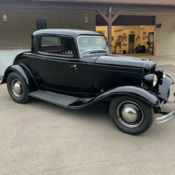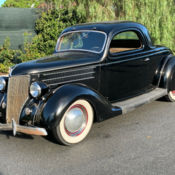|
General Description Please DO NOT bid on this car yet. I just raised the first bid price to 20 times what I had planed to start it at to keep people from bidding until I can correct and complete my description of this car. I started working on this listing a couple of weeks ago and forgot it was scheduled to start this evening. Once I have corrected the several historical errors in this description. I will drop the first bid price to $4. 95 and let the action run. I am out of town and will not likely be able to complete this description until some time on Sunday January 25 at the earliest. I am sorry for any confusion or frustration this might cause and appreciate your patience. Bob Woodburn This very special Model A Ford convertible coupe or cabriolet was originally manufactured around June of 1930. It is believed that this car was shipped new to eastern Montana by rail from the Ford assembly plant in Chicago. If you know how Model A's were distributed back then. please let me know. This car was modified in 1936 by Roman Chupp of Bloomfield Montana for Milton Hill. also of Bloomfield Montana. Milton used it to deliver rural mail around Bloomfield Montana which is in northeastern Montana. A Model T Ford truck rear axle assembly was installed along with four Goodyear 11. 25 x 24 pneumatic tractor tires mounted on 24" tractor tire rims. These wide and tall tires let this car float over packed snow drifts as well as plow through deep loose snow due the increased ground clearance. These tires were introduced in the mid 1930's and were Goodyear's first pneumatic farm tractor tires. They had a diamond with a hole in the center for the tread pattern. This distinctive tread design was not self-cleaning when running in mud so these tires were not as popular with some farmers as they might otherwise have been. Goodyear had thousands of various sizes of this type of tire in their warehouses in the late 1930's and found it hard to find homes for them. They eventually sold them for snow applications such as on this car or for use on agricultural equipment such as grain combines that were normally only used in dry weather conditions. The four tires on this rig and now 78 years old so they are showing their age but they are still in relatively good and pliable condition. You can still see the name GOODYEAR painted white on all of them. This may have been done at the factory but I am not certain about that. There are lots of checks and small cracks in them. The left front tire has a three inch long split in it so someone may have installed a boot (a section of a tire used to reinforce a weak spot in a tire casing) inside the tire many years ago. Amazingly. none of the four very special tires ever appeared to have sat flat as usually happens with vehicles of this age. When that happens. the tires often develop bad cracks. become weak in the flat spot and later blow out. These ancient tires have some minor flat spots on them so when I drive this car. it does not ride smoothly. I have never driven it over 10 miles per hour or so. At that speed there is enough tire vibration to make the front fenders flop a bit which makes this car look like a big bird which just ate too much trying to take off and fly. I have listed the mileage on this car as being only 25. 49 miles because that is what is shown on the speedometer odometer. That may be how many miles were on this car when Leonard wound up with it for the snowmobile conversion. After the Model TT Ford truck rear axle assembly was installed. there would have been no place to drive the speedometer as there was on a stock Model A Ford drive shaft housing. The rear axle and wheels are from a Model TT truck in order to get the higher numerical axle ratio to handle the larger diameter tires. The front wheels are made from 21" 1928 or 1929 Model A wheels. The outer row of spokes was long enough to reach the 24" tractor rims. The inner crossed spokes were completely removed and replaced with spokes about 3" longer. All welds on this conversion were done with a torch because electric arc welders were still a scarce item in rural Montana in the early 1940's. Please notice the 5/16" x 2" steel straps used to mount the rear fenders. They were torch welded to the thin steel on the back of the body and to the thin fenders. This took a very good welder who knew what he was doing in order to avoid burning through the light sheet metal. The inner parts of the front fenders have been cut and extended with sheet metal triangles in order to raise them up to clear the large front tires. The backs of the rear fenders have been modified in a similar way and were opened up to a larger diameter. The rear fenders were torch welded directly to the body quarter panels above the wheel wells. This car was originally dark blue and was repainted a medium blue about the same time it was converted for mail delivery. The top is not the original and was replaced a long time ago. Whoever installed the custom replacement top did not tailor it properly so it could fold down. I suspect whoever had the original top replaced was more concerned with keeping the eastern Montana weather out than enjoying fresh air on the nicer days. The front seat upholstery is the original whip cord and is in tough shape. The rumble seat back rest is the original black material and is still in amazingly nice original condition. A mail man removed the rumble seat cushions so he could haul more packages and groceries for his customers. Some Early History Since I first listed this car here on eBay back in May of 2014. I spent several hours over a few day period a few months ago calling people around Lindsay and Bloomfield in north eastern Montana. I have learned a lot of very important history relating to this car and I want to share that history with you here. I eventually learned that Milton J. Hill of Bloomfield Montana used it to deliver rural mail before Leonard Quammen even owned it. The old Montana title for this car has the number 254564 and was issued on 10/22/41 to Leonard J Quammen of Lindsay Montana. This title listed a $200 lien if favor of Lester H. Hill who was the administrator of the estate of his father Milton J. Hill. The lien was paid off a bit over a year later on 11/30/42 so Lester H. Hilled signed the lien release at about that time. The fact that this title had a $200 lien on it in 1941 sparked my interest to dig deeper into the history of this very special mail car. Why would anyone have a $200 lien on a 11 year old Model A Ford unless it was worth more than a normal Model A for some special reason? After making some more calls to the area around Bloomfield Montana and talking with several residents there. I located Lester H. Hill's daughter Ardice who would be Milton J. Hills granddaughter. She was born in 1934 and barely remembered her father and grandfather using this car to deliver rural mail there. She informed me that there was an early photo of this car in the book "Our Times. Our Lives” A History Of Dawson County. I had already found a copy of that book here on eBay so I opened it up to the history of Milton J. Hill's family and there the photo was. It is shown as the second photo of this listing. That photo is not of great quality so I had my friend enhance it as much as possible using here Photoshop program. That photo shows Milton J. Hill leaning of the left front fender of this very car that happens to have the driver's door open for some reason. The caption under the photo mentions that Roman Chupp modified this car for Milton J. Hill. I can date that photo to being no later than 1940 thanks to help from Ardice. She told me that her grandfather Milton J. Hill and several of his friends were living in Bloomfield Nebraska but decided to come to farm west of Glendive around 1910 or so. They brought their families with them and started farming there and later named the town Bloomfield Montana in honor of the town they were recently from in Nebraska. During the tough times there. Milton supplemented his farm income by delivering rural mail. He may have used horse drawn vehicles before hiring Roman Chupp to build a snowmobile from a Model A Ford. Milton went back to visit friends and family in Bloomfield Nebraska sometime in 1940. Unfortunately he died in a head on collision with a drunk driver while he was near Bloomfield. Ardice told me that the gear shift lever (which was most likely still on the floor unless he had a relatively new car) entered Milton's body in the wreck and he died in a local hospital a day later. Milton's son Lester H. Hill finished his father Milton's rural mail delivery contract for the rest of the year of 1940. He then sold this car to Leonard Quammen who used it deliver mail in tough weather for several more years. Leonard Quammen farmed near Lindsay Montana that was about 30 miles away from Bloomfield Montana. Leonard had mail routes both north and south of Lindsay. He would deliver mail on one route on Monday. Wednesday and Friday and deliver mail on the other route on Tuesday. Thursday and Saturday. I called Ardice just a few days ago and she told me that she found another photo with Milton sitting in this car with the driver's door open and his left foot on the running board. She promised to have here granddaughter scan that photo and email it to me. I had hoped to have that photo on this listing before it started. I have only 23 photos on this listing so far so I can add that photo of Milton in this car as soon as I receive it. Ardice's brother Hal is still living and I was able to talk with him. He remembers spending his summers with his grandfather Milton who mentioned that this car "came from Chicago on the train". I can't understand that unless Model A Ford cabriolets were not assembled in the Twin Cities Ford plant that supplied most of the Model A's in this part of the country. Could a relatively low production model like the cabriolets only have been assembled in certain plants such as the Ford plant in Chicago? I am hoping an authority on this subject reads this and gets in touch with me. More Recent History I have nick-named this car "Bigfoot" when I displayed it at the Model A Restorer's Club national meet in Merrillville. Indiana in 2009. There were over 300 cars there but I suspect this ugly old beast attracted more attention than any other car there. I gave at least 200 people rides in it around the parking lot even though the brakes don't work at all yet. While I was at that Model A meet. it was very interesting to note how people reacted to this gem. I would say the majority of them appreciated it for what it was made into and encouraged me to preserve it they way it is now. Several people simply could not understand how anyone could "hack up" a car as scarce and desirable as a Model A cabriolet is. Every time I patiently reminded them that any Model A cabriolet was most likely nearly worthless in 1940 or 1941. That was because the folding top covering would have been about 10 years old at that time and in poor condition. Very few people in Lindsay Montana would have had any use for a "topless" Model A Ford. Why would anyone invest $35 or so in having a convertible top installed on a car worth about that same amount? I suspect Leonard acquired this car for next to nothing. had the conversion done to it. found out that it worked OK on the bad roads and later on had a new top installed that did not fold down. I have over two hundred vehicles in my collection and have never had any vehicle create as much interest and attention as this car does. I showed it at a local car show a few years ago and won the antique class over 6 other nicely restored Model A and V8 Fords. This is not a show car and I don't collect trophies but I was happy to see the crowd show their appreciation for a truly special and unique "survivor" vehicle like this. I really treasure this car as it is. due to it's special history. and would never restore it. I have worked hard to take care of it and preserve it just as it is. The third from the last photo is of original artwork done a few years ago for me by Don Greytak of Havre Montana. Don is well known for his fabulous and super realistic pencil sketches of farm and ranch life as well as transportation related topics. The image measures 12" high by 15-1/2" wide while the outside of the frame measures 20" high by 23-1/2" wide. Please notice the "US MAIL" sign above the front license plate and the pair of stick on defroster shields which are still on the inside of the windshield of this car. It appears that Leonard Quammen used the rumble seat to deliver a Christmas tree to a friend who is on horseback. This unique piece of artwork sells with this car. At this time. I know of at least 3 more Model A Ford mail delivery cars that are still in existence but they have been neglected and are in poor condition. I also know of a WW II Dodge 1 ton 4wd chassis that a mail carrier installed a Chevrolet sedan body on. He then installed 4 road grader tires and used this vehicle to haul mail for many years. This vehicle still exists in a friend's junk pile and I am trying to get it. I can barely remember it as a child. The owner of that vehicle had Polio and built it while working in a wheel chair. I have no idea how he ever got into and out of that vehicle but I do know he always took somebody with him when he used it for mail deliveries in tough weather. Back in 2009. I advertised a 1914 Model T Ford engine block for sale here on eBay. The first photo of that listing showed the bare block setting on the right hand running board of this car. Below is the interesting comment I received from an early automobile enthusiast: "My gosh. you are probably getting more response to your Model A than the blocks ever would. Your listing information is great history on this mail car! Being a cabriolet is even more amazing. and it appears to be very original in top fabric and rumble seat. I have a 1930 cabriolet. and this style model is the one with roll-down windows as opposed to the more common roadster of only side curtains. Of course folks would say to restore the rarer cabriolet. but you have a "national treassure" as they'd say on Antiques Roadshow. If you took this to Hersheys this fall. you'd steal the whole show! What an amazing blend on enginuity. Useful nessesity and folk art! Does it run? The National Mud shows would beg you to display it. Hot Wheels would want to make a toy example of it. "Don't restore or touch it". would be the advice of many. but to preserve it. Find out all the history on it. he maker. etc. This is THE mail truck of the American landscape. Big thank you for your response to my Ebay Ask a Question inquiry. I went back to your listings. and clicked your Completed Listings. On the wooden bumper listing. I found more photos. history. and where to find more snaps of your amazing mail truck cabriolet. Wow. Your writing of this vehicle's history is sure commendable. You are treating it as the special unique beast it is. and realizing its value as what it is. To take it apart toward a restored Model A cabriolet would be to ruin a brilliant creation. To make it into a hot-rodded mud monster would be an equally sad fate for this surviving WWII vintage home warrior. To nurture it back true to it's 1941 state of being. nbsp;should be the only option. if one so cared to do. In the history of America making home-made tractors of Model T's and A's. or work-horses of the engines and frames to keep life rolling. or snowmobiles. and mail trucks. this is a superb grand-daddy for them all. Another rural mail carriers US postage stamp of this vehicle would not be out of the realm of possibilities. As a winter mail truck. your vehicle not only could keep the mail going through. but could be a winter ambulance. nbsp;road opener. cattle-feeder in blizzards. and welcome sight every snowstorm. I'm sure your mail truck has many tales in its history. Your astute history of the tires says much. (Airplane bomber tires and wheels after WWII were also surplused to many a combine here in Kansas. ) I showed a Goodyear dealer your close-up photos. and we agreed you might contact Goodyear and see if they would sponsor you toward anything with your grand beast. After all. your vehicle made their tires useful to serious use. and they are still rolling! The fact that the tread did not work will in mud. but in snow. is a saving grace plus. Your machine together with the Goodyear blimp. would be a sensation anywhere! The ingenuity and how parts were all combined. would make a vocational-agriculture article. and for Hemmings. too. The farm-made as opposed to factory-made. is American heartland at its best. And yet the most amazing thing about the vehicle. is how it's proportions work. It has more character than a Disney talking car cartoon! It is bigger than life. nbsp;and visually jumps out of the photos. An auto designer couldn't top it for appeal. as you have sure noticed as People's Choice. Jay Leno would be honored to be seen with this real car character. and he would surely enjoy contact on this. too. Of course you'd want a stack of T-shirts with this on the front anywhere you show it. State Fairs. Dollywood. and all. I won't be able to afford this. if I keep bragging on what all you have there. and you might not want to ever sell it. Bob. ou'd maybe want to at least have it in a high-end national auction after promoting it and enjoying it around the country. If handled right. nbsp;you have an item that would be a huge draw at the Smithsonian or Chicago Institute of Science and Industry as a showpiece in their collections. This is an honest masterpiece of all the vehicles made in hard times. wars. and doing the impossible. And being a cabriolet just crowns it all as in an ornery grin. " Well. this guy named Roger Hubert sure liked this mail delivery car so I just emailed him 5 years after the above letter letting him know it is here on eBay with his comments. I will be adding more information and photos soon and will drop the first bid price at that time. Thanks a lot. Bob Woodburn - phone 406-799-1847 in Bozeman Montana My friend Stan Howe from Helena is an auctioneer that knows a lot about a lot of different things including collectible vehicles like this. Back in March of 2008 he sent me about a dozen photos of this car and mentioned that it would be selling at one of his upcoming living estate auctions in Havre Montana. He also mentioned that he thought it was my kind of car and his is right. I tend to color outside the lines a bit and be interested in things that most "normal" people are not interested in. Stan had a local mechanic in Havre clean the fuel system and do general service work on this gem so that it would run on it's own power long enough to impress the crowd during the auction sale. The mechanic sand blasted (not bead blasted) at least the outside of the original Zenith cast iron carburetor for some reason that I will never understand. This car did run without smoke or unusual noise but it did not run well due to carburetor mixture problems. Stan knew I have been working on Model A Fords since I was in the 8th grade so he asked me to drive this beauty (or ugly) through the auction ring for him even though he knew I was very serious about owning it. As it came time to sell it. I started it up and drove it into position using the choke to help regulate the mixture. I assume the main jet was messed up or plugged but I have not torn that carburetor apart yet. I will have a nice running original Zenith cast iron carburetor on this car when it sells. Stan introduced me and mentioned that I had an extensive car collection. liked Model A Fords and unusual vehicles. was helping him out at the sale and that I would also be bidding on this car. I wanted this car so badly that day that I was quite nervous which is unusual for me since I have bought many hundreds of vehicles. nbsp;tractors. toys. signs and other collectible items at auctions so far in my life. I don't remember where the bidding started but I do remember that the under bidder was a friend's wife and she was very disappointed that she did not get this car. She said that if she had won it. she would have restored it. Evidently she had no appreciation for the modifications done to this car. She was unhappy with me winning the auction and was not her normal friendly self toward me for about a year after that auction. Now she can look back and laugh at this incident. I was not smart enough to bring my trailer to the sale that day so I had to leave this car in the auction hall for a couple of days until I could get back there with my trailer. I drove it out of the auction hall and had a friend take a few poor videos of me driving this car out and onto my trailer. I had no enclosed trailer at that time so I wrapped several blankets around the very fragile old convertible top and very carefully secured them with several nylon straps to protect the top from the wind on the way home. I have an original open Montana title for this car that was issued to Leonard Quamenn back in 1940 or 1941. That title is an important and valuable part of the history of this car so I have not yet transferred ownership to my name. I can do that and have the Montana DMV return the old title to me. I can also apply for a completely new title. That process only costs $12. 00 and takes about two weeks to get the new title. The problem is that with Model A Fords that have the serial number on the top of the frame and under the body. the Montana DMV requires that some goofy non-Ford number be used at least at the start of the title application process. Since other states handle this problem with Model A serial numbers differently. I have decided to work with the new owner on options regarding a new title if they even want one. I would not encourage anyone to ever drive this beast on a public road anyway for several reasons. The first and main reason is that this vehicle is completely unique and can not be repaired or replaced if it is ever damaged. The second reason is that this vehicle is a hazard on the road because it literally stops traffic. The third reason is that this vehicle currently has no brakes and may never have had good brakes since it was converted so many years ago. I will address this brake issue later. The original title is for a 1930 Ford convertible coupe with an engine number that is of 1930 vintage and about the right vintage for this car. I assume the number on the title matches the frame number on this car. The engine in this car is from a 1929 Model A Ford so it is obviously a replacement engine. Most (like over 75%) of Model A's I find. have owned or seen have had at least one engine swap at some time in their past. It is even harder to find a commercially used Model A like this that still has it's original engine because those vehicles were used harder than the typical Model A passenger car was. Back in the 30's and 40's. it was much less expensive to install a good running used engine than it was to have one rebuilt due to the work required in re-babbiting the main and connecting rod bearings. Please note that the photo that shows the left side of the engine shows an electric heater installed in the water inlet casting. I have never seen one like this before and assume this it was built by the handy blacksmith that converted this car. Please also note that original two blade fan is still on this beast. I suspect this car was generally used in cold weather so nobody felt that a 4 blade fan was necessary for better cooling. The paint on the right hood top is not as good as on the left side hood top so I suspect that there may have been a minor carburetor fire on that side at one time even though I have never known of a Model A to have a carburetor fire. It appears that nobody ever even attempted to make brakes work on the rear wheels. That may have been because Model T's had only cast iron brake shoes inside the rear axle drums because they were only parking brakes. The service brake was inside the transmission on all stock Model T's and TT's. This conversion may never have had good brakes because one Lindsay Montana resident mentioned that Leonard drove this car into the post office there one time. That same person also mentioned that Leonard enjoyed tipping a few now and then so that may also have been a factor in the post office building colliding with him. That person also mentioned that the local residents referred to this car as being the "beast" or the "tank". Another Lindsay resident recalled that Leonard got stuck in a snow drift on main street one day. He recruited a few guys from the local pub to help push him out of the drift. Supposedly one helper was pushing from behind the car and did not get out of the way in time when Leonard decided to back up and take another run at the drift. Leonard backed over that guy who was not hurt because of the soft snow. wide tires and relatively light car. The helper was not hurt but did scream at Leonard when he was under the middle of the car to keep Leonard from running over him a second time. Another Lindsay resident mentioned that Leonard was giving a rural school teacher a ride to town one day when the hot water heater hose inside the car broke and sprayed coolant on her stockings. Leonard stopped and whittled a wooden plug to stop the leak and refilled the cooling system before continuing on toward town that day. As you can see. this car still has some of the original whipcord upholstery in it. I call it the $800 seat because there is a 1/8" diameter steel rod that is sticking out of the top of the bottom cushion about 4" where the driver sets. I took this car to the local show about 3 years ago and that rod ripped a hole in my right rear pants pocket where I keep my billfold without me realizing it. I lost my billfold with $800 in it somewhere later that day and it has never turned up yet. This car has a Briggs body which is actually based on a Briggs Fordor sedan body. The cabriolets use modified Briggs Fordor sedan front doors. cowl. firewall. windshield structure and windshield frame. The original wood sills at the bottom of this body are in excellent condition as is the wood framing in both doors. This body has absolutely NO rusted out sheet metal in it anywhere thanks to our relatively dry climate here in Montana and the fact that every owner from Leonard Quamenn onward has taken excellent car of this car and kept it inside. I can't even find any evidence of mice ever having spent their lives in this car which is unusual here in the rural parts of Montana. I have been thinking of how this car might be displayed and enjoyed in the future. These 4 Goodyear tractor tires are coming up on 80 years of age and would be nearly impossible to replace if damaged. I would really hesitate to even try to remove one from the rim to repair if for fear that some bead wires might be weak due to age or break due to the stress from dismounting and remounting a tire. One could buy 4 new 24" tractor rear rims from the M. E. Miller Tire Company for bout $110 each plus shipping. One could install 4 new 12. 4-24 (replaces old size 11. 25-24) lugged rear tractor tires for $310 to $325 each plus shipping. It would be easy to adapt these new rims to the Model TT truck rear wheels. One would probably want to duplicate the modified Model A Ford 21" wheels that are on the front axle. That way one could enjoy this car without any fear of damaging or destroying the impossible to replace fragile old original Goodyear farm tractor rear tires. I will be adding more information before this listing ends. Thanks again. Bob Woodburn - phone 406-799-1847 Tuesday morning and later. Other Model A Ford Local History As an interesting side note to the issue of the fragile convertible top. I will add another related story. My Dad was born in 1921 and grew up on the home ranch north of Geraldine Montana. He worked together with Grandpa and Grandma for many years who never owned a pickup truck. They had a 1929 Model AA Ford truck and later added a 1937 International D-15 tonner to the fleet. After WW II. Dad drove 70 miles to Great Falls Montana and paid $35 each for a 1929 Model A Tudor sedan and a 1929 Model A business coupe. It was like a sport coupe with no landau irons and had a trunk rather than a rumble seat. Dad drove them home and then did something terrible to each of them. Dad had a large Lincoln electric arc welder generator powered by a 1934 Nash Advanced Eight straight 8 engine. He fired it up and used it to burn the back off of the business coupe. He then built a respectable looking wood box for it and had his very first pickup truck. He usually drove it to the field and hauled fuel and supplies in the box. He mentioned working in the field one day before a severe hail storm came along. The tractor had no cab so he hid behind one of the rear wheels of the tractor until the storm stopped. He then walked back to his Model A pickup and found that the hail storm had completely shredded the canvas top covering. Since the car now was "topless" he simply tossed his jacket into it through the open top. I still have that pickup which was built it January of 1929 so it still had the old style 7 tooth sector steering gear. Dad mentioned that the steering gear was worn out so bad that the steering wheel had about an eighth of turn of slop in it. That made it hard to drive so his trick was to drive near the edge of the road so the car would pull to the right and he would have to pull back some on the steering wheel. It is a wonder that he never went into the ditch. Once he changed oil on the engine and forgot to tighten the oil drain plug. Thank goodness the car had an oil pressure gauge on it and he happened to notice the needle jumping around. He walked back to where the trail or oil started. found the oil drain plug. walked back to the dead Model A. installed the oil drain plug. filled the engine with tractor motor oil and continued on to the field. Dad removed the Tudor sedan body from the other car. shortened the chassis. mounted the rear axle rigidly to the frame. nbsp;installed an auxiliary transmission from a burned up 1929 Chevrolet and mounted a 25 foot long paddle elevator above the other Model A. He added a flat belt pulley between the Model A transmission and the Chevrolet transmission. By putting the Model A transmission in gear and the Chevrolet transmission in neutral. he could use the power from the Model A engine to drive the paddle loader and use it to load grain. He used it in harvest to unload trucks and well as later in the year to empty the grain bins and load trucks when hauling the grain to the grain elevator in town. This "grain loader" as we called it was quite an innovation before the grain augers became popular in the early 1950's. 7 Videos Of This Car In Action On Snow https://www. youtube. com/channel/UCrqqso1ZtEYfVDoOeXEXeGg/videos A Video Of Goodyear Making These Tires In 30's The following link is to an original Goodyear promotional film from the late 1930's. It shows how pneumatic rubber rear tractor tires are such an advantage over the older wheels with steel tires. It is almost 30 minutes long and well worth watching. The later part is fascinating because is shows how those early tractor tires were made in Goodyear's factory. https://www. youtube. com/watch?v=1caZGv_2Pf4 This car was featured in one of the September issues of "Old Cars Weekly" back in 2014. You can click on the link below to view that article entitled "Car Of The Week" : http://www. oldcarsweekly. com/car-of-the-week/car-week-1930-ford-model This car was featured on pages 22 and 23 of the May-June 2010 "Model A News" magazine published by the Model "A" Restorers Club. This car was also mentioned but not shown in the history of the Quammen family in the book "Our Times. Our Lives” A History Of Dawson County. This interesting book discusses the history of the country around Glendive Montana and includes a section describing Lindsay Montana. I recently found a copy of that book here on eBay so that copy goes with this car. I later learned that this car is shown in a different section of that book that is devoted to the residents around the town of Bloomfield Montana. It is shown with the history of the family of Milton J. Hill. I forgot to mention that this car is nearly 6-1/2 feet tall which makes it difficult to transport in a typical enclosed car trailer that has a vertical rear door opening of just over 6 feet. When I haul this car in my enclosed trailer. I remove the front wheels and install a pair of 1935 Ford 16" wire wheels and tires. That drops the front of this car enough so that it can be driven in and backed out of my trailer with a bit of room to clear over the convertible top. The last photo of this listing shows this gem with the small tires in front. They make it look very strange - somewhat like a drag car - low in the front and ready for takeoff on a drag strip. Thanks again. nbsp;Bob Woodburn - phone 406-799-1847 in Bozeman MT
|
 Home
Home Contact us
Contact us NEWEST CARS
NEWEST CARS SELL YOUR CAR
SELL YOUR CAR FAQ
FAQ
